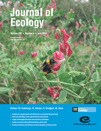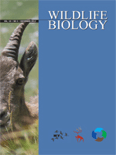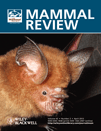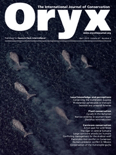
Human-Wildlife Interactions
Scope & Guideline
Connecting Ecology and Conservation Through Research and Dialogue.
Introduction
Aims and Scopes
- Human-Wildlife Conflict Management:
Research addressing the various forms of conflict arising from human-wildlife interactions, including strategies for mitigation, management practices, and community engagement. - Conservation Success Stories:
Highlighting successful wildlife conservation efforts, particularly in urban environments, to demonstrate the potential for coexistence and the positive impacts of conservation initiatives. - Impact of Human Activities on Wildlife:
Investigating how human activities, such as urban development, agriculture, and tourism, affect wildlife behavior, habitat use, and population dynamics. - Policy and Stakeholder Engagement:
Examining the roles of policies, regulations, and stakeholder perceptions in wildlife management and conservation strategies. - Innovative Research Methods:
Utilizing advanced methodologies such as drone technology, machine learning, and ecological modeling to study wildlife interactions and inform management practices.
Trending and Emerging
- Urban Wildlife Conservation:
An increasing emphasis on the role of urban areas in wildlife conservation, reflecting the need to address how urbanization impacts wildlife and how conservation efforts can be integrated into urban planning. - Community Involvement and Education:
A rising trend in involving local communities in wildlife management and conservation efforts, emphasizing the importance of education and stakeholder engagement in achieving sustainable outcomes. - Human Health and Safety Concerns:
Research focusing on the implications of wildlife interactions for human health and safety, particularly in relation to wildlife attacks and zoonotic diseases, is gaining traction. - Ecological Impacts of Technology:
Exploration of how modern technology, including drones and machine learning, is being utilized to study wildlife interactions and improve management practices. - Climate Change Effects on Wildlife Behavior:
An emerging focus on how climate change is altering wildlife behavior and habitat use, and the implications for human-wildlife interactions and conservation strategies.
Declining or Waning
- Traditional Wildlife Management Practices:
Research focusing solely on conventional management techniques, such as culling or trapping, seems to be decreasing, as there is a growing preference for more humane and sustainable solutions. - Invasive Species Control:
There is a noticeable decline in the number of papers specifically addressing invasive species management, possibly due to a broader focus on coexistence and holistic ecosystem approaches. - Generalized Human-Wildlife Interaction Studies:
Studies that broadly cover human-wildlife interactions without specific context or focus are becoming less frequent, indicating a shift towards more targeted and context-specific research.
Similar Journals

Journal of Zoo and Aquarium Research
Exploring the depths of zoology and aquatic sciences.Journal of Zoo and Aquarium Research is an esteemed publication dedicated to advancing the field of zoology and aquatic sciences. Published by the European Association of Zoos & Aquaria (EAZA), this journal provides a dynamic platform for sharing groundbreaking research, best practices, and conservation efforts within zoos and aquariums, making it an invaluable resource for researchers, professionals, and students alike. With an increasing focus on the importance of biodiversity and sustainable practices, the journal is committed to fostering scholarly communication that enhances the understanding of animal care, species conservation, and habitat preservation. Although specific metrics such as impact factor and HIndex are currently unavailable, the journal's rigorous peer-review process ensures that only high-quality research is disseminated. As an open-access publication, the Journal of Zoo and Aquarium Research promotes accessibility to vital information, encouraging a broader engagement with critical issues in wildlife conservation. By addressing contemporary challenges in the field, this journal stands as a pivotal resource for those dedicated to promoting animal welfare and ecological sustainability.

JOURNAL OF ECOLOGY
Connecting researchers through impactful ecological studies.JOURNAL OF ECOLOGY, published by Wiley, stands as a leading publication in the field of ecology, evolution, behavior, and plant science, currently positioned in the prestigious Q1 quartile across these categories. Established in 1976, the journal has consistently provided a platform for innovative research and critical discourse related to ecological patterns, processes, and interactions. With its robust Scopus ranking—31st out of 721 in Ecology, Evolution, Behavior and Systematics, and 26th out of 516 in Plant Science—this journal notably reflects the high impact and influence of its articles in the scientific community. Although it does not offer open access options, the journal ensures comprehensive dissemination of pivotal findings to researchers, professionals, and students alike. Located in the United Kingdom at 111 River St, Hoboken, NJ, the JOURNAL OF ECOLOGY remains an essential resource for those dedicated to advancing our understanding of ecological systems and their complexities.

WILDLIFE BIOLOGY
Championing impactful solutions for wildlife management.WILDLIFE BIOLOGY is a prestigious open-access journal published by WILEY, dedicated to the dissemination of high-quality research in the fields of ecology, evolution, behavior, and conservation. With an impressive Impact Factor indicative of its scholarly relevance, the journal has been a cornerstone for researchers since its inception in 1995, now extending its convergence through 2024. Recognized within the top Q1 and Q2 quartiles across various categories—including Ecology, Evolution, Behavior and Systematics and Management, Monitoring, Policy and Law—this journal plays a crucial role in fostering knowledge and promoting effective solutions in wildlife biology. The journal serves a diverse audience, offering robust access options since 2014, ensuring that vital research is freely available to professionals, researchers, and students alike. With its base in Denmark, the journal encourages contributions that address pressing wildlife management issues and informs policy development, further cementing its significance in the ecological research community.

WILDLIFE SOCIETY BULLETIN
Fostering interdisciplinary insights for wildlife stewardship.WILDLIFE SOCIETY BULLETIN is a premier publication in the field of wildlife management and conservation, published by Wiley. With an ISSN of 2328-5540, it serves as an essential resource for researchers, professionals, and students invested in advancing knowledge related to wildlife ecology, behavior, and conservation practices. Although currently not open access, the journal provides a platform for high-impact research and critical insights that contribute to the sustainable management of wildlife and their habitats. The WILDLIFE SOCIETY BULLETIN aims to foster interdisciplinary discussions and provide a vital connection between academia and practical applications, ultimately promoting a deeper understanding of wildlife conservation challenges and solutions. Located at 111 River St, Hoboken, NJ, it continues to be influential in disseminating significant findings that shape policies and practices in wildlife stewardship.

PACHYDERM
Connecting researchers to elevate the conservation of elephants.PACHYDERM is a reputable journal dedicated to the study and conservation of elephants, published by the esteemed IUCN-SSC Asian Elephant Specialist Group. It serves as a crucial platform for researchers, conservationists, and wildlife professionals to disseminate innovative findings and share insights into elephant ecology, behavior, and conservation strategies. Featuring an impressive scope from 2008 to 2015 and resuming from 2017 to 2023, the journal falls within the Q3 category of Animal Science and Zoology, reflecting its growing impact in the field with a Scopus rank of #367/490. Although currently not open access, PACHYDERM's content is vital for those committed to advancing our understanding and protection of these magnificent creatures. By fostering collaboration and highlighting critical research, PACHYDERM plays an integral role in promoting global awareness and conservation efforts surrounding elephants.

MAMMAL REVIEW
Innovating the Study of Mammals for a Sustainable FutureMammal Review is a distinguished scholarly journal published by Wiley, focusing on the interdisciplinary study of mammals within the realms of Agricultural and Biological Sciences, Animal Science and Zoology, and Ecology, Evolution, Behavior and Systematics. With an impressive impact factor and consistently ranking in the top quartile (Q1) across several categories, this journal serves as a pivotal platform for researchers seeking to explore innovative findings and theoretical advancements in mammalian science. Since its inception in 1970, Mammal Review has evolved to include a diverse array of articles including synthesis reviews, empirical research, and theoretical pieces, ensuring that it remains at the forefront of mammalian studies. Researchers and professionals alike value this journal for its commitment to enhancing our understanding of mammal biology, conservation, and ecology, making it an essential resource for anyone involved in the study of wildlife and ecosystems. The journal, based in the United Kingdom, adheres to stringent peer-review standards, ensuring the publication of high-quality research that resonates with its global audience.

ORYX
Connecting Researchers for a Greener TomorrowORYX, published by Cambridge University Press, stands as a prestigious scholarly journal in the fields of Ecology, Evolution, and Conservation. With an ISSN of 0030-6053 and E-ISSN 1365-3008, this journal has been a critical platform for researchers and professionals since its inception in 1950. Recognized for its excellence, ORYX ranks in the Q1 quartile for both Ecology, Evolution, Behavior and Systematics and Nature and Landscape Conservation as of 2023, highlighting its influential contributions to the field. With a strong focus on disseminating innovative research and fostering collaboration among scientists, the journal covers a broad array of topics, from biodiversity and ecosystem services to conservation strategies and policy implications. As a result, ORYX provides invaluable insights that help shape the future of environmental science. Its impressive Scopus rankings place it in the top 80th percentile in its categories, further underscoring its importance and appeal among academics, professionals, and students alike.

Journal of Fish and Wildlife Management
Advancing conservation through innovative research.The Journal of Fish and Wildlife Management, published by the U.S. Fish & Wildlife Service, serves as a vital resource for scholars, researchers, and professionals in the fields of Animal Science, Ecology, and Conservation Biology. With its ISSN 1944-687X, this esteemed journal has been disseminating critical research findings since 2010, contributing significantly to the understanding of fish and wildlife conservation practices and their ecological impacts. Despite its Q3 category rankings in various disciplines as of 2023, it provides a platform for innovative research that influences policy and management strategies for biodiversity conservation. The journal, although not open access, remains committed to advancing the scientific discourse surrounding wildlife management with articles that emphasize practical conservation efforts and ecological sustainability. Readers can expect a diverse range of articles that promote best practices in the management and conservation of fish and wildlife resources, furthering our collective mission of preserving ecological health and biodiversity for future generations.

Global Ecology and Conservation
Championing innovative solutions for environmental challenges.Global Ecology and Conservation, published by Elsevier, stands as a premier open-access journal dedicated to advancing the field of ecology and conservation science. Since its inception in 2014, the journal has facilitated the dissemination of high-quality research, fostering critical dialogue on ecosystem management, biodiversity preservation, and sustainability practices across the globe. With a remarkable ranking within the top quartiles (Q1) in various categories including Ecology, Evolution, Behavior and Systematics, and Nature and Landscape Conservation, it is positioned among the leading resources for researchers and professionals alike. The journal has garnered a notable impact, ranking #65 out of 721 in Ecology, and houses articles that are vital to understanding and addressing the pressing environmental challenges of our time. Available in an open-access format, researchers can freely access and share vital findings, promoting a collaborative approach to ecological research. Global Ecology and Conservation is not just a publication; it is a critical tool for innovation and advocacy in conservation, poised to inspire the next generation of environmental stewards.

EUROPEAN JOURNAL OF WILDLIFE RESEARCH
Exploring the depths of biodiversity and its preservation.European Journal of Wildlife Research, published by SPRINGER, is a key academic resource in the fields of ecology, evolution, behavior, and systematics, as well as management, monitoring, policy, and law related to wildlife conservation. With an impressive Q2 categorization among its peers, this journal serves as a vital platform for interdisciplinary research, fostering dialogue among researchers, conservationists, and policymakers. The journal focuses on innovative studies that delve into wildlife ecology, population dynamics, and species management, contributing significantly to our understanding and preservation of biodiversity in various landscapes. Although its coverage in Scopus ended in 2003, the journal's heritage is deeply rooted in the field, dating back to its inception in 1955, and continues to influence contemporary research practices. As an open-access journal, it allows for broad dissemination of knowledge, ensuring that vital findings reach a global audience, making it a valuable reference for students, professionals, and academics committed to wildlife research.